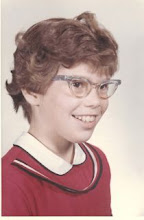I would say that rhythm is Barbara's writing fingerprint. Ditto for picture book author extraordinaire, Ann Whitford Paul. My friend and co-author, Mary Nethery, stamps her work with tight plotting and elegance, as does Kathryn Galbraith. My buddy, Dave Patneaude, weaves in sensory details like nobody's business. And people like Helen Ketteman and Kathi Appelt and Susan Patron and Bonny Becker are recognizable for their use of language, be it poetic or particular or hyperbolic or heart-breaking.
I think my "signature" is voice. Not that I've got a handle on it in my WIP ( I believe my muse when she says I'll get there) but I think that's one thing that captured people about Hattie.
 Thanks to the adorable young woman here, I heard Hattie's voice loud and clear. This is a photo of my most beloved maternal grandmother, Lois Thomas Wright Brown, at age 14, shortly before she ran off and married her 17-year-old beau. But that is, as they say, another story. I spent many hours -- a lifetime!-- with my grandmother, talking over countless cups of tea, hearing her Kentucky birth, her hard-scrabble rural Washington growing up and her Depression-era Seattle dialects in every word she said.
Thanks to the adorable young woman here, I heard Hattie's voice loud and clear. This is a photo of my most beloved maternal grandmother, Lois Thomas Wright Brown, at age 14, shortly before she ran off and married her 17-year-old beau. But that is, as they say, another story. I spent many hours -- a lifetime!-- with my grandmother, talking over countless cups of tea, hearing her Kentucky birth, her hard-scrabble rural Washington growing up and her Depression-era Seattle dialects in every word she said.I knew Hattie's story because I knew my grandmother. And women like her. Women like Vanity L. Stout Irving who rejected her fiance's gift of a ruby engagement ring: "I told him I wanted a cow and three pigs for a wedding present."
Let's assume for the sake of argument that my fingerprint is voice (Mr. Random House is waiting patiently for proof of same. Me, too.). I'm wondering what you think your fingerprint is? The thing that marks your work as uniquely yours.
Dish! Tell me what it is. Point out examples of other folks' so we can all learn.
But let's also remember to celebrate what it is that is uniquely ours.
(This is one of those instances where you should do as I say and not as I do.)

Richard Peck and Polly Horvath (and others not crossing my mind right now)beautifully create moments that are simultaneously hilarious and tragic. It's so hard to be funny AND sad at the same time! I aspire to this kind of humanity in my writing, probably because I myself am prone to giggle fits at things like funerals. :o/
ReplyDeleteI think that voice is critical in writing books that people will love. I certainly related to Hattie's voice, and I look forward to reading your next example.
ReplyDeleteI mostly only write reviews, and technical things for work, and so on. But a friend just said to me the other night that he thought that my special ability was being able to explain complex ideas in a way that makes them accessible to people. I've mostly applied that to my work, but your post has me wondering if I shouldn't be applying that "fingerprint" more directly to ideas about reading and literacy. So, thanks for making me think, on a rainy morning.
I agree voice is a "fingerprint" in Hattie's story, and that's so important in a first-person novel. I'm going to be brave here and compliment myself as well, as you've asked:
ReplyDeleteI think the voice of the protagonist in my series is also one of its strongest elements. I not only had to step back in time to WWII for her voice, but I had to become English. A critiquer told me that I could save myself a lot of trouble by telling the story in third person so only my dialogue had to be English, but that just didn't work for me. So I labored over every sentence of my first book, trying to make her sound like an English girl of my grandmother's generation. And I've had more than one person tell me I've done it, so in the midst of rejections, I chose to believe that:)
First of all - aw shucks, Kirby. Thank you so much for those kind words. We definitely have a Mutual Admiration Society going on. And just so you know, I am convinced we can totally be best friends - although I also must correct you. I am, indeed, perfect. :-)
ReplyDeleteThis is a great subject and got me thinking about authors whom I think have "signatures." One who comes to mind is Robert Cormier. I think his signature is the ability to go to dark places in his stories/characters - but on such a human level that we an all relate and not feel like he is dragging us down. Not an easy feat.
Thanks for the food for thought.
Barbara O'C
Lori, you reminded me of so many folks I didn't name, including my hero, Karen Cushman, a master of voice! I've never giggled at funerals but I do have the awful nervous habit of laughing when my husband gets hurt. Inappropriate, but involuntary. He loves me despite this flaw.
ReplyDeleteJen, oh I think your friends have got it right! I love that very element of your reviews -- you observe things I've missed in a book and bring them to light in ways that are easy to understand.
Emilie, you go girl for acknowledging your gift! Yes! You get a gold star for the day.